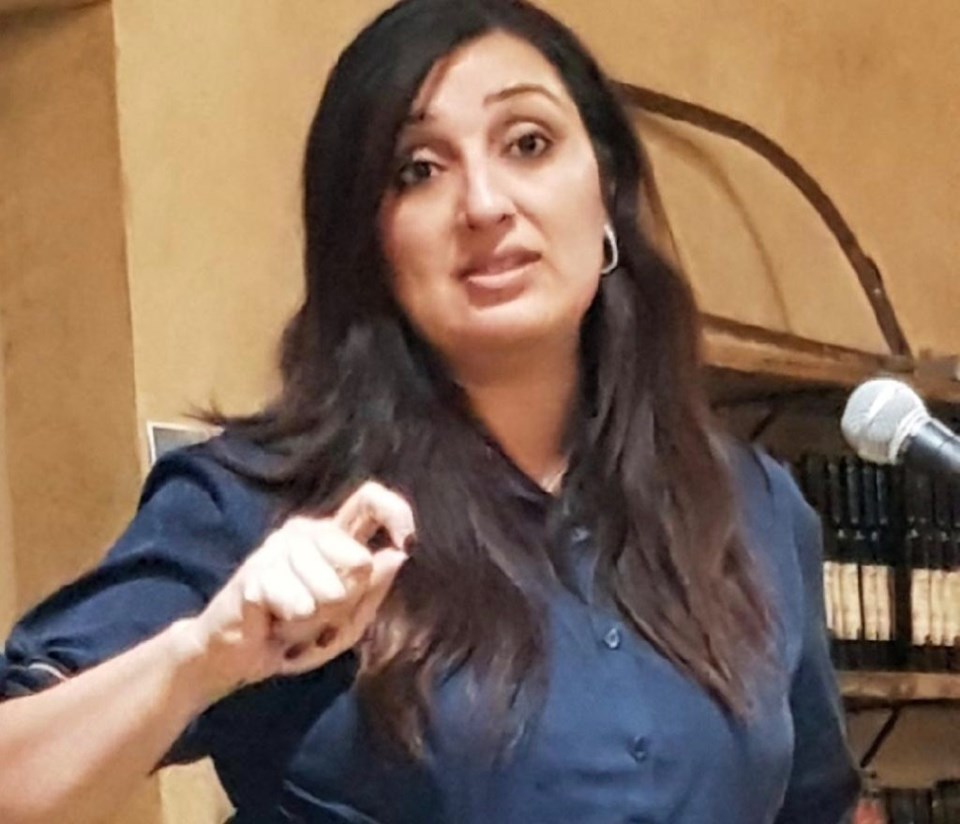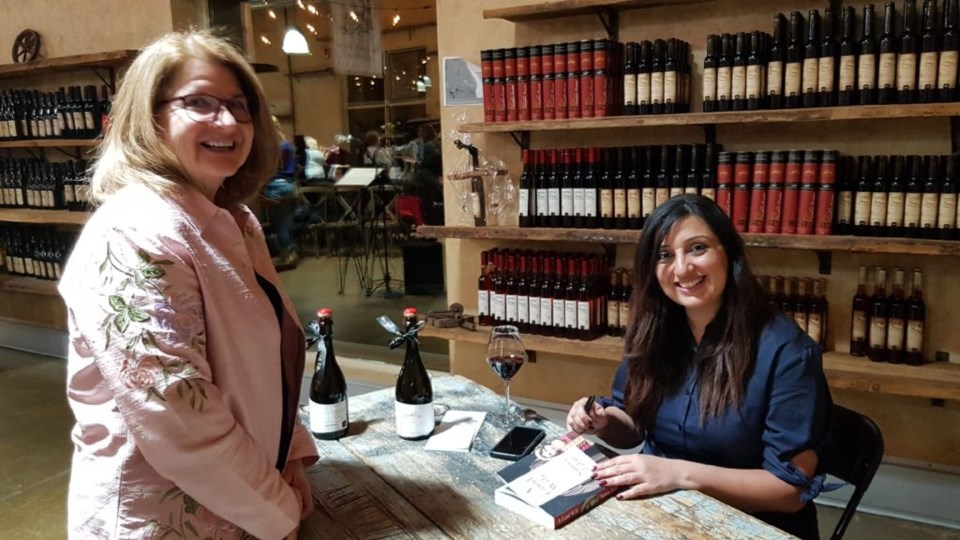
When Samra Zafar came to Canada as a 17-year-old bride, she was terrified of leaving her home and family in Pakistan, but excited at the thought of finishing high school and fulfilling her dream of a university education in a country that would offer her freedom.
Instead, her husband, 11 years older, quickly turned abusive, and her life became one of a prisoner in the home they shared with her in-laws, with no possibility for her to continue her education.
Zafar, author of A Good Wife: Escaping the Life I Never Chose, was the speaker at last week’s Wine & Words event, organized by Debbie Krause of the Niagara-on-the-Lake Public Library, and hosted at Hare Wine Co.
Zafar’s story begins with the description of a happy childhood in the United Arab Emirates, where her father worked, and her progressive parents encouraged her to do well in school, with the promise of a university education. At 16, she was told there was a man in Canada who wanted to marry her, and after meetings between her parents and his, her fate was sealed.
Her hopes for continuing her education were dashed by controlling in-laws, who believed her job was to be a good wife to their son, which included constant subjugation and obedience to her demanding mother-in-law.
In the years that followed, she had two daughters to care for, and no hope of escape from a miserable existence, her dignity, security, and independence stripped from her by a man who had a quick temper, and was daily verbally, emotionally and physically abusive. She was kept isolated, walking on egg shells and living in fear for her safety, never knowing when the next violent attack would come, often in front of her girls.
In her book, and in speaking at Wine & Words, Zafar’s story and her description of feelings of despair, helplessness, and even invisibility helped shed some light on what goes through the mind of an abused woman — that it was her fault, that she needed to try harder, do better, and that she had nowhere to turn for help.
She described it as “living in a dark box, with just enough air to breathe,” and said she had suicidal moments, but reminded herself she had to go on for her children.
She thought of her older daughter, she said, “and I knew I had to go on for her. If I wasn’t around, she would be pushed into an early marriage as I was, and she wouldn’t get to go to university.”
Her daughter now wants to make films, “to bring stories like this to life,” she said, with pride, while her youngest daughter is a “science nerd” who wants to work in the medical field.
The portion of her book she chose to read at Wine & Words was not the most dramatic, but represents the turning point in her life — when, after starting a day care in her home and saving some of the cash she earned, she was able to enrol in classes and walked into a lecture hall at the University of Toronto for the first time.
That was the start of her liberation, where she found a support system, friends, and counsellors who helped her escape her old life and create a safe haven for her and her daughters. Leaving her husband was not simple — at one point she faced being homeless with her two girls — but several part-time jobs at the university, and a student apartment, made it possible.
The strong, confident woman standing before the audience at Hare Wine Co. has taken control of her life and become a successful corporate businesswoman, but she has not forgotten what it took to get there. She has become a speaker, mentor and activist, helping abused women escape their cycle of abuse. She also is working to end child marriage — it’s legal in Canada for girls under 18 with parental consent. Under some circumstances, that may not be necessary if a judge says so — usually because the girl says it’s what she wants, said Zafar. In both those situations, the law can work to allow arranged child marriages, which she describes as legalized pedophilia. “No 16-year-old should ever be put into that situation,” she said. “If I can accomplish one thing in my life, it would be to put an end to that.”
Despite her self-confidence and assured manner, there is an element of sadness not far from the surface. She is not close to two of her three sisters, who lead “traditional” lives in their Muslim community, or her mother, who encouraged her to stay with her husband rather than bringing shame on her family as a single woman.
Yet she says her only regret is that she didn’t leave her marriage sooner. Her oldest daughter, during the early days of their new life, gave her strength, but as a teenager went through her own struggles, unable to grapple with the memories from her childhood. At that time, “always at loggerheads,” said Zafar, their relationship broke down and they grew apart. After years of her daughter self-harming and a suicide attempt, she was diagnosed with and received treatment for PTSD, and through therapy, she and her mother became close again.
Her girls choose not to have contact with their father, Zafar said, adding he continues to blame her for poisoning them against him.
She describes a recent poignant conversation with her oldest daughter, who is now 18. She reminded her mom of an incident when she was six or seven, and had made a card for her father. She asked if she could give it to him, and they both went to his room to present it. He flew into a rage over being disturbed, Zafar recounts, and after hurling humiliating insults at her, started to beat her, with her daughter watching.
“She said to me, ‘I’m really sorry for that. It was my fault. I hope you can forgive me.’ My heart broke to pieces that she had carried that with her,” said Zafar, bringing tears to the eyes of many in the audience.
She made two announcements that excited the crowd: a movie and a second book are both in the works.
The book is being co-written with her daughter, about the years when they were apart, and coming back together. It also talks about the effects of family violence on children, she said.
The movie is being produced by Bell Media, and will chronicle her life as described in her book. She has made sure she will have creative input, she said — she wants to ensure it “sticks to the story without being sensationalized.”
She doesn’t want it to become a “cultural piece.” While her situation was in the context of her Muslim culture, she is clear in her book and her speaking that abuse against women is universal, and she doesn’t want that part of the story overshadowed, she said.
“One out of three women will suffer some kind of abuse,” she said. Women with violence in their lives, who need help, who need to make a connection, can sometimes find that in one moment of kindness, of someone reaching out to them in the simplest of ways. “Making them feel they matter, can make a difference. What could be worse than feeling invisible?”
